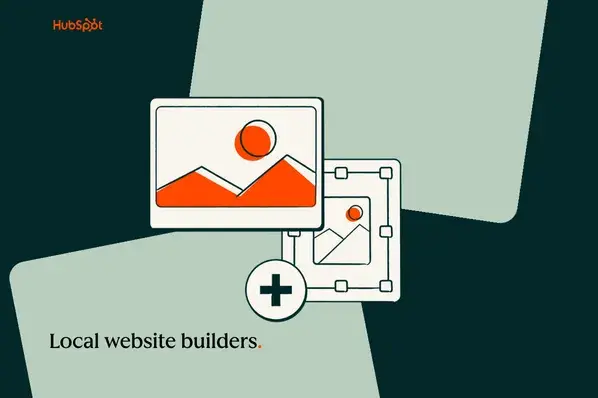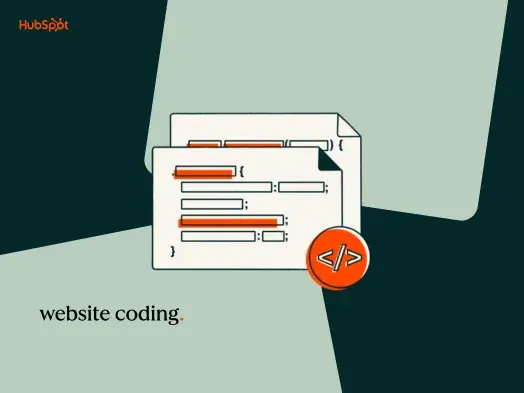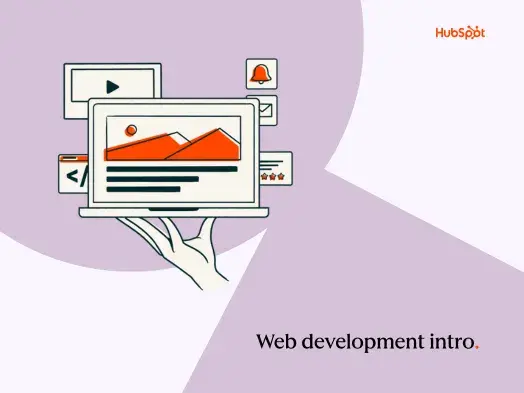I didn’t know the difference between web design and web development. So, figuring out who to work with and how to bring the two disciplines together to actually get the website launched was frustrating.
Thankfully, I’ve learned a lot since then. In this post, I’ll explain design versus development so you can figure out which one you need. I’ll also share insights from someone who’s both a web designer and developer. Then, I’ll show you how I’ve built my own websites — as someone who is neither. Read on.
Table of Contents
- What is website design?
- What is website development?
- What's the difference between web design vs. web development?
- Web design vs. web development: What are the similarities?
- What should marketers know about web design vs. web development?
- How to Build a Website Without a Designer or Developer
- Web Design vs. Web Development: Both Are Essential for Your Website
What is website design?
Website design focuses mainly on how your website looks and feels, with an eye toward user experience. It is the first phase of a project to create a website.
The responsibilities of a web designer include conducting client discovery, selecting color palettes, and designing mockups. However, a designer isn’t there just to make your website look good.
“As a designer, I don't make things pretty,” says Melody Christian of Finicky Fox Design in an Instagram video. “Okay, well, I do, but that's just a byproduct of what I’m trying to achieve with my design."
She adds, “When I sit down to work on a design project, I don't ask myself, 'How can I make this pretty?' I ask myself, 'How can I give this purpose?'”
From your brand identity to the call-to-action button on your landing page, a web designer helps your business achieve its goals through visuals.
Also worth noting: UI/UX designer is another title many web designers use. But, not all UI/UX designers consider themselves web designers. For instance, some UI/UX designers focus on mobile app design, not web design.
What is website development?
The next phase of creating a website is website development, which focuses on the mechanisms that allow the site to work correctly. Typically, a web designer hands off their designs to a web developer who then brings the designs to life through coding.
You’ll often find web developers on engineering teams. That’s because web development is a subset of software engineering. While a web developer might identify as a software engineer, not every software engineer identifies as a web developer (they might, for instance, work only on mobile apps or video games).
Keep in mind that there are two categories of website developers: frontend and backend (they might also go by the titles “front-end engineer” and “back-end engineer”).
A front-end developer writes code that determines how the website displays the web designer's concepts. A back-end developer must correctly manage the data within your site‘s database and enable that data to display on the website’s front end.
What's the difference between web design vs. web development?
There’s a lot of overlap between web design and web development. It's not uncommon to find a developer with a working knowledge of design, or a designer who knows HTML and CSS.
To make matters more confusing, people often use the term “web design” to encompass the broader term of “web design and development,” just because the former is shorter and easier for non-designers/non-developers to understand.
However, web design and web development are disparate, and investing in both is essential for delivering an exceptional user experience. They work in tandem to craft an engaging, functional, cohesive website.
Here are some of the biggest disparities between the two.
1. Website developers are not responsible for designing creative assets.
The main difference between web design and web development is that while web designers make visual assets that add aesthetic value to the site (and enhance user experience), web developers are responsible for building those functionalities.
So, a web designer will create mockups or wireframes using software such as Figma or Sketch.
Then, a developer will translate the designer's mockups, wireframes, and other assets into code using JavaScript, CSS, and HTML.
So, the creation of visual assets is the responsibility of the website designer, whereas using code to make those assets appear on the website is the job of the website developer.
2. Website designers are not responsible for writing code.
Another difference between web design and web development is that designers usually do not write code.
Many web designers are at least familiar with HTML and CSS. Both of those languages are extremely useful because they control the visual parts of a website. (Knowing a little HTML and CSS is how I’m able to customize parts of website themes even though I’m not a developer).
However, a designer wouldn’t be expected to know programming languages like Python or PHP. Of course, there are exceptions — but generally speaking, designers aren’t held accountable for coding.
Consider a web designer's primary responsibilities. These include:
- Interviewing the client to understand their goals
- Using software like Photoshop to edit images
- Creating mockups in Figma
However, coding is not involved in any of these tasks, so that’s where web development steps into the picture.
Alternatively, some companies work with “no-code” website builders so designers can beautify the site and enhance the user experience without coding.
3. You'll usually pay less for web design vs. web development.
Traditionally, web design is less costly than web development. ZipRecruiter shows that, as of November 2024, web developer roles make an average of $45/hour, whereas designers make an average of $35/hour. There are anomalies, but usually, you'll pay less for web design versus web development.
Why? Because web development requires more technical training, such as learning to code. Supply and demand also impact the average cost — there are likely more web designers than developers. However, if you seek an adept web designer or developer, you can expect to pay more than the average rates.
4. Website design focuses on how a site looks and feels; website development focuses on how the site works.
Remember this: The difference between web design and web development boils down to the role that each plays in website creation.
While website development adds functionality to the site through code, website design seeks to enhance the user experience and interface and make the website one that customers want to view.
As a result, these subsections of creating a website are equally essential.
Web design vs. web development: What are the similarities?
To better understand the similarities between web design and development, I spoke with someone who does both. Tammy Hart is a self-taught web designer and front-end developer. (“There's not a whole lot of us out there,” she admits.)
As Hart explains: “If you picture a spectrum between design and development, there‘s an area of design that’ll never see code, and there‘s an area of development that’ll never see design. And then, as they get closer together, you get closer to the middle, they start to overlap a lot.”
So, where do they overlap?
1. Both have a role to play in creating an engaging user experience.
If you want customers to keep coming back to your website, focus on user experience.
User experience ensures that customers have a positive association with the website and, therefore, the product. If your site's user experience is lacking, customers will become frustrated and decide to take their business elsewhere.
While design guarantees that customers will have an easy-to-navigate experience on your site, development ensures that the website is properly functioning. A website that doesn‘t work correctly isn’t valuable to consumers, no matter how beautiful it is.
2. Both must work in unison to create a cohesive site.
Maybe you're wondering if investing in website design and development is necessary, and here's why the answer is yes. Both have to work in unison to develop a cohesive, functional website.
“Typically, on any project, you‘re going to need both,” Hart told me. “You’re going to need somebody that can help maneuver user experience: ‘How does it look? How does it feel?’ And they're going to have to cover, ‘How does it work?’”
Without design, a website would feel impersonal. Without development, a website wouldn't operate correctly; it probably wouldn’t even make it out of the Figma file.
The result of design and development working in unison is an exceptional web experience.

What should marketers know about web design vs. web development?
If you’re a marketer researching the difference between web design and development, it’s likely you’ve found yourself in charge of a website design or redesign.
Here’s what you should know:
If you want a custom website, you need both a designer and a developer.
I define “custom website” as one that’s built from scratch. This differs from a website that’s built using a website builder, template, or theme.
While web design and web development are two different fields, having one without the other would be silly: You wouldn’t be able to complete your custom website.
Let me illustrate this for you from this humorous conundrum I found on Reddit:
A web designer was contracted by a client to design a website. The client loved how the website design looked, so the designer sent the client the Figma file and an invoice.
This is where things got tricky: The client had expected a working website — not just a Figma file showing a website design.
As one Redditor aptly commented, “Gently remind them that they hired a web ‘designer’ not a web ‘developer.’”
This story highlights why it’s so crucial to understand design versus development. To prevent a similar fate for yourself, here’s how it should play out if you’re looking for a fully functioning website:
If you contract a web design agency, it should be able to handle both design and development.
It might call itself a “web design agency” or “web development agency,” but it does both because, again, clients expect a working website in the end.
The agency probably has in-house or contracted designers and developers to complete the project.
If you contract a freelance web designer, they’ll probably partner with a developer to complete the website.
As I mentioned earlier, while there are exceptions, a web designer typically doesn’t know how to code a full website. The designer has to hand off the approved designs to a developer who can build them from there.
So, if you hire a freelance web designer, be prepared for two common situations:
- They’ll use a drag-and-drop site builder like HubSpot or Squarespace to create your website without code.
This is commonplace and perfectly fine for simple websites. It also speeds up build time and typically reduces costs.
This might become problematic if you have a complex website or web app that needs custom coding. If this happens, you’ll be restricted by your designer’s limited or nonexistent knowledge of web development.
- They’ll partner with a developer to bring your website design to life.
This might cost more because it requires more time and resources, but it works best for complex websites or web apps that need custom coding.
If you’re unsure about the process for any web designer, developer, or agency, be sure to ask before you commit to working together.
How to Build a Website Without a Designer or Developer
In the intro, I promised to tell you how I built my own business websites even though I’m not a designer or a developer.
My secret? Content management systems (CMS) and website builders. Of these, I’ve used the following:
- WordPress
- Weebly
- Squarespace
These are “no-code” solutions that come with themes (premade website design templates) that you can then customize through plugins and drag-and-drop editors. That way, you never have to touch code.
So, instead of editing code that looks like this:

You edit in a drag-and-drop builder that looks like this:

The downside is that you’ll be more limited in what you can build. That’s because if you don’t know how to code custom elements yourself, you’ll have to make do with whatever widgets/modules/plugins are available in the website builder platform.
And for your brand assets, you don’t necessarily need to have a designer for that either. You could use this brand kit generator to create assets such as logos and color palettes to use on your website.
Web Design vs. Web Development: Both Are Essential for Your Website
In the end, I did get my employer’s new website redesign off the ground. We ended up contracting an agency that had a team of developers who coded our design ideas into a real website.
That was my trial by fire in learning the difference between design versus development — and why both are so crucial.
Remember, if you’re trying to create a website and you don’t have an in-house team, you’ve got three main options:
- Hire a freelance web designer.
Best for: Simple websites and a smaller budget
The freelancer will likely partner with a developer who can code their design into a working website. - Hire a web design and development agency.
Best for: More complex websites and a bigger budget
Their team likely consists of dedicated web designers, web developers, and much more (such as graphic designers and account managers) who will work as a team to build your website. - Use a no-code website builder.
Best for: Businesses that need a website fast and want to be able to easily customize and maintain it
This has been my preferred route throughout my career as a blogger and digital marketer. I’ve been able to build three niche blogs that I eventually sold.
Using themes (premade website design templates) and customizing them with a no-code editor (for me, it was WordPress) made web design accessible for me.
However, the websites I built were pretty standard, with no complex features.
Or, you could do a mix: Use a website builder and have a designer or developer customize aspects of it for you. That’s why we have HubSpot Partners, after all.
Editor's note: This post was originally published in May 2022 and has been updated for comprehensiveness.
Website Development


.png)



![How to make a website with user accounts and profiles [with WordPress, Wix, and more]](https://53.fs1.hubspotusercontent-na1.net/hubfs/53/%5BUse%20(3).webp)
![How to build a Google Site that looks good and drives business [templates & examples]](https://53.fs1.hubspotusercontent-na1.net/hubfs/53/Website%20Redesign%20Terms.png)




